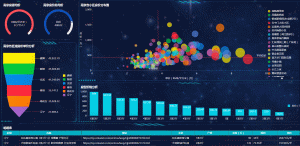Supply Chain Management (SCM) is a complex and critical process that involves planning, executing and controlling the flow of goods and services from the point of origin to the point of consumption.
One of the most complex challenges in SCM is reconciling supply and demand, to which sales and operation planning provides a solution. However, successful sales and operation planning implementation demands a deep understanding of the supply chain processes and data. This is where supply chain analytics becomes pivotal, adding insight and innovation to optimise SCM operations.
This article will attempt to explore the importance of supply chain analytics in SCM. Read on to learn more.
What is Supply Chain Analytics?

Supply chain analytics is the practice of using data analysis and business intelligence tools to gain insights into the performance of a supply chain. It involves collecting and analysing data from various sources such as suppliers, manufacturers, logistics providers and customers.
By utilising supply chain analytics, companies gain unprecedented visibility into their supply chain operations, allowing them to track inventory levels, monitor supplier performance and avoid potential bottlenecks or disruptions.
Armed with these powerful insights, companies can make data-driven decisions to optimise their supply chain efficiency, reduce costs and provide unparalleled customer service.
What are the Different Types of Supply Chain Analytics?
Supply chain analytics encompasses various analytical methodologies, each with distinct characteristics and analytical approaches. The types of these techniques are as follows:
- Descriptive Analytics: It is concerned with getting insights into the past events of an organisation’s supply chain operations. It employs techniques such as data visualisation, statistical analysis and trend analysis that can summarise historical data and detect prevailing trends and patterns.
- Predictive Analytics: This involves harnessing past data to generate predictive models for future occurrences. It is particularly useful for helping businesses anticipate future demand, identify risks, optimise supply chain operations and pinpoint opportunities.
- Prescriptive Analytics: It offers guidance on the most optimal course of action to achieve predetermined outcomes. It integrates both descriptive and predictive analytics to suggest an action plan for a given scenario.
- Diagnostic Analytics: It focuses on ascertaining the underlying causes of issues or anomalies in supply chain operations. It uses techniques such as data mining and drill-downs that can identify inefficiencies within a firm’s supply chain processes, allowing for targeted improvements.
- Real-time Analytics: It enables businesses to obtain instantaneous insights into their supply chain operations. It leverages current data to provide real-time decision-making support for inventory management, logistics, transportation and other real-time supply chain activities.
The Significance of Supply Chain Analytics
The significance of supply chain analytics in SCM cannot be overstated. It provides valuable insights into the complex processes of supply chain operations that are often unpredictable and irregular.
Below are a few reasons why supply chain analytics is important in SCM:
Better Decision Making
By offering significant insights into supply chain operations, supply chain analytics assists organisations in making educated decisions. These insights may be utilised to optimise supply chain operations and save costs.
Inventory Optimisation
By giving real-time access to inventory levels, demand trends and supplier performance, supply chain analytics may assist organisations in optimising their inventory levels. This data may be utilised to make better inventory management decisions and lower inventory expenditures.
Enhanced Customer Service
Organisations may use supply chain analytics to track the delivery of goods and services, monitor customer feedback and respond to consumer concerns as quickly as possible. This enables organisations to enhance customer satisfaction and deliver better customer service over time.
Risk Management
Organisations can detect and manage supply chain risks, supply chain interruptions, supplier performance concerns and demand fluctuation. This is also achieved through supply chain analytics, which gives them real-time visibility into their supply chain management operations.
Conclusion
The world of supply chain analytics is an ever-evolving and complex arena, with businesses striving to gain a competitive edge by harnessing the power of data analytics. It is imperative that organisations recognise the pivotal role of supply chain analytics in driving business success and invest in the technologies and expertise necessary to unlock its full potential.
If you are an aspiring supply chain professional looking to enhance your supply chain management skills, then look no further. Imarticus’s Advanced Certification Program in Digital Supply Chain Management is the ultimate IIT supply chain management course incorporating the latest supply chain analytics concepts.
This supply chain analytics course provides a comprehensive and practical digital supply chain management approach. You’ll learn how to apply cutting-edge supply chain analytics techniques, design effective supply chain networks and optimise supply chain operations. With expert instruction from industry leaders and real-world case studies, you’ll gain the knowledge and skills required to excel in the dynamic world of supply chain management.













